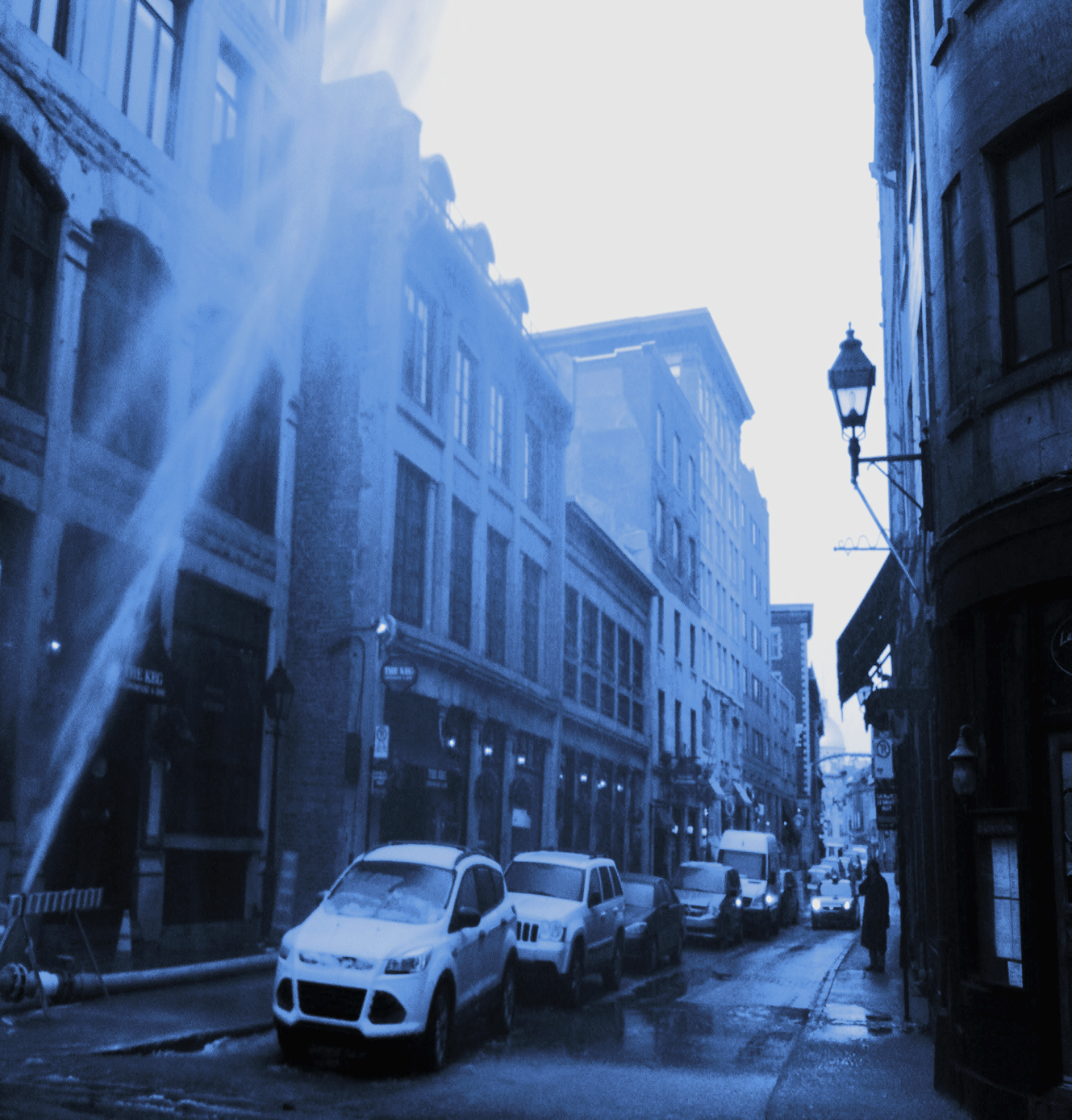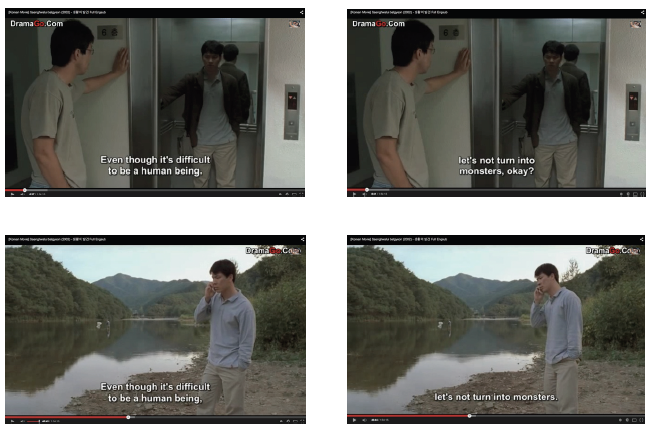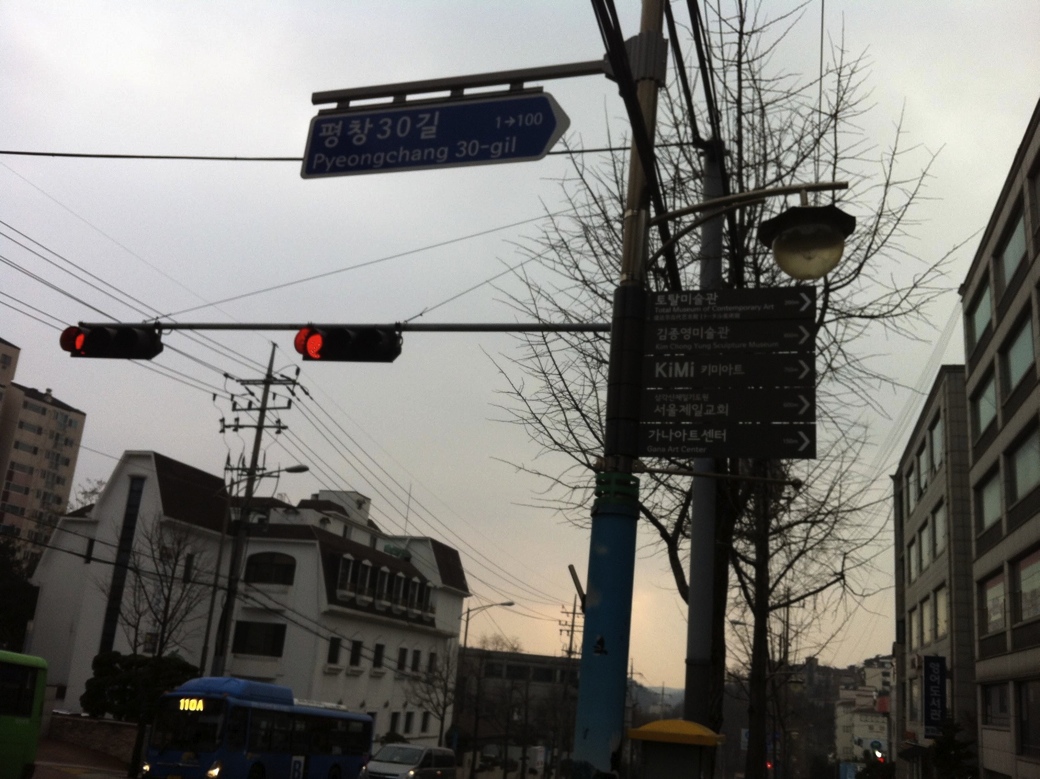More Than Three Moves, Wind from the East to the West
Mi-Jeong Lee

ACT I: Revisiting Fables – China

“One who believes all of a book would be better off without books”
(尽信书,则不如无书, from 孟子.尽心下) [1]
Neighbours were butchering a pig that they raised in the village where the little Mencius lived. The little Mencius asked his mom why people were killing the pig. His busy mother spontaneously said it was for Mencius’ meal. She realized her unconscious lie which was taken seriously by her son. He was excited by the expectation of the meat for dinner. She went to buy a piece of the meat with the little money she had.
Mencius was born in the territory of Chou. [2] His mother sent the little Mencius off for his studies to the modern territory of Noh. Feeling lonely, the young Mencius returned back to his village to see his mother. His mother ripped the threads in the loom that she was weaving on as soon as she saw Mencius walking into the yard. She asked Mencius whether the ripped cloth in the loom was useful anymore, cloth that she had been working very hard on. It would be the same for Mencius to stop his studying halfway through. The little Mencius burst into tears and returned back to Noh to continue his studies.
When Mencius was very little, he lived near a cemetery. One day, his mother realized that Mencius was playing, mimicking ritual mournings with his friends. His mother moved to a different area close to the market. Mencius began to impersonate merchants’ business when he played with his friends. His mother again moved their home near a school, then Mencius started to imitate teachers and students, reading books and learning.
2. I introduce three famous fables [3] from the mother of Mencius [4] whose education method is widely used in Korea and the rest Asia. The fable of the pig suggests how Mencius’ mother taught her son about honesty. In the second fable, his mother teaches him the hardship of study. The third fable is from one of the most famous Chinese idioms, 孟母三遷 (mèng mǔ sān qiān). The literal translation is “Mencius' mother, three moves” that inspired the title of this paper.
Mencius’ mother’s vigorous and committed teaching practice of her little boy, who became a great philosopher, has been widely influential for Korean parents in the education of children. The parents and the country regard this as the best educational model to practice. Moving the geographical location of home or school forces the children to overcome emotions for a higher educational goal. For them, setting a higher social-political goal in mind above anything else is important.
Looking back, I was raised and educated in a similar manner and environment. Below is a flashback of the past twenty-years since my arrival in Montreal and how it has evolved.
My parents used to say to my two elder sisters and I that they sacrificed themselves to educate us. I knew that my father was working hard to raise his children to provide a better condition of life and to afford the education fees like any parent in Korea would do. Since there was no government subsidies or loan-bursaries, all tuition fees were paid mostly by parents. Mencius' mother (who raised Mencius on her own) would have had an even harder time than my father who also carried the heavy burden of tuition fees.
My father was a really stubborn man who was hard on himself in order to become a better person. He taught his children to be the same way. I remember that even if I pretended to be sick for school, I had to go. I was never absent or late to class until graduating high school. My father wanted his children to carry out his unfinished dream of ‘a successful life.’ I, however, was never an excellent student while my eldest sister always had the best marks and, on top of that, had an innate charm wherever she went. All of his attention was on my sister. I was no longer a good student from late highschool. Instead, I began to find my own way of rebelling against my father for my own freedom. Eventually, my father forced me to go to a university that was not the top one like my eldest sister and chose management as my field of study even though my interest was in arts and literature. Instead of being in class, I skipped courses that I didn't enjoy. I would hang out at disco-dance bars almost every night for several years. One thing that I continued was to read all sorts of books following my eldest sister's habit.
At home, we had a curfew of 9pm set by our father. None of us were allowed to stay overnight even at our relatives’ houses. Despite receiving a scholarship, my sister was unable to persuade my father to allow her to study abroad in the United States which everyone dreamt about doing back in the 1980s. She married soon after finishing university. [5] I felt like my father was a camel to my sister who was a lion to me. [6]
After my graduation, I began to work as a reporter at a newspaper. Due to my job as a journalist, I was excused from my father's protocol at home. I was able to travel everywhere in Korea. Eventually, I came to Canada even though it was not my intention to end up here. My father paid less attention to me and he treated me like a little girl who would go onto marry someone. My insignificance in my family was the doorway to creating my own life; something that I didn’t even realize back then.
I was the one who moved away from my parents, from my hometown and from my past before I ever married. I was reborn as a 2-year-old or another human with a new language, English.
Walking into this process was quite radical for me physically and psychologically because of the circumstances of how I grew up and the geographical distance. Was it a good decision to move away from my familiar culture to study even in the eyes of my parents, my friends and society? I wanted to have some sort of affirmation. Their response was that I was wrong.
Still, my quest continues of “being here and there”; in between my old timeplace [7] – my parents and family, their values, Korean culture and my innate ethics. A new divergent timeplace – an immigrant, a visible minority, an ethnic, a culturally diverse person, the colour of people... that I never knew before all these sovereign vocabularies which indicate or adhere to me.
I became unfamiliar with both places. I was turning into a lion.
ACT II: Walking Fables – Montreal

Fig.2 Image credit: Mi-Jeong Lee. Montreal, January 2014.
“If a lion could speak, we could not understand him.” (Wittgenstein 1958: 223)

Fig.3 Screenshot frames of the film, Turning Gate (2002), Directed by Hong Sang-Soo.
“Even though it's difficult to be a human, let's not turn into a monster“
Dialogue in the film Turning Gate (Hong Sang-soo 2002)
A sign says
'I am homeless. I have frostbite, I am cold and hungry...'
A group of buskers plays music a few steps away from the homeless man
An open guitar case looks like a black hole
2. Music waves
A frozen body opens his heavy backpack
Nickles fly into the can of the frostbitten man, not in the musician's
Thousands of strings and shivering fingers dance in movements at intervals
3. Snowflakes blow.
Wind-chill -25 C.
One's coat is tightened against the wind on the street.
A fatigued one glances at a fire station through the transparent windows.
A prepared sandwich sitting alone on a kitchen table.
Seemingly its locus is lost while waiting.
Somewhere a fire-hose sprays water in the air.
Thousands of snowflakes spread around in the dark sky.
Snowy wind blowing around the deserted street of Place d'Armes.
No bus has arrived yet.
It's a damn cold night.
My horizon of a single life started at the age of 31 in Montreal. I walk everywhere; see, observe, feel. I am often afraid to talk until I comprehend the world around me. ‘Décalage’ lives not only in time-space but also stays in my body. Maybe that is why I feel comfortable in a plane where I feel set free.
I have spoken English for over two decades. I try mimicking a native English speaker’s voice, accents, and gestures. Nevertheless, words, especially abstract words that carry or contain feelings, emotions and sensations, hardly speak to me, or touch my heart. Those words were like echoes for me. People asked me to repeat over and over again as if a lion was mimicking English to them with roaring. Keeping things silent, my sensory motors would become my form of language. The silence is my processing time to comprehend. There is no talking, yet I talk to you, I respond to you in silence. Do you hear me? NO. Do you feel me? ‘ … ‘
I was turning into a lion.
I live in a new territory where the locus cannot be found. I live in duality. On the one hand, everything seemed familiar on the surface where it seems easy to become one identity. On the other hand, I realized that unfamiliarity always stays: I am perceived and others perceive me as a stranger. Becoming a new citizen/person never happens either in my hometown, or in a new territory like Montreal. The distance is always there like how we look at the horizon which is not real, yet it is always envisioned.
I encounter a lion in three different instances. One is the cultural voice of Wittgenstein's lion, the second one is the repeated dialogue in a film of Hong Sangsoo in two different scenes where he uses the word ‘monsters’ that, somehow, I perceived as meaning lion. Lastly, there is Zarathustra’s morphing lion. Why these three lions having grown and roared inside me... I am still wondering.
My brothers, why is there a need in the spirit for the lion? Why is not the beast of burden, which renounces and is reverent, enough?
To create new values—that even the lion cannot do; but the creation of freedom for oneself for new creation—that is within the power of the lion.
The creation of freedom for oneself and a sacred No even to duty—for that, my brothers, the lion is needed. To assume the right to new values—that is the most terrifying assumption for a reverent spirit that would bear much. Verily, to him it is preying, and a matter for a beast of prey. He once loved thou shalt as most sacred: now he must find illusion and caprice even in the most sacred, that freedom from his love may become his prey: the lion is needed for such prey. (Nietzsche 2006: 16-17)
ACT III. : Time-lapsing Fables – at Any-Space-Whatever

Fig.4 Image credit: Mi-Jeong Lee. Seoul, December 2014.
Of three metamorphoses of the spirit I have told you: how the spirit became a camel; and the camel, a lion; and the lion, finally, a child.
Thus spoke Zarathustra. And at the time he sojourned in the town
called the Motley Cow. (Nietzsche 2006: 16-17) [8]
A feeling feels hard to feel about a stranger.
A feeling of being a stranger.
It says, stay still.
2. Moving away mouths.
Closing eyes.
Turning an ear.
Lalala!
3. Swing back and forth.
Montreal-Chicago-Tokyo-Seoul, again Seoul-Chicago-Montreal.
The linkages, yet nowhere and everywhere [9]
Shame. I have to limit my physical sharing of time-space with my beloved ones, parents, families, friends and good ones. As I love talking, laughing, eating, sleeping together with the ones yet an intruder utterly seizes time-space and shouts, ‘move!’
Being temporally from here to there. No house is for a stranger as a place, yet intervals of time-lapsing become a familiar home in any-space-whatever. [10]
My father was a camel to my sister who was a lion to me; my father became a child, she became a camel; a lion lives in me.
My father doesn’t know that I feel-think of a breeze of the doorway (a horizon), a nomadic journey.
Ettinger paints the field, but is also painted by it. “I allow the paintings to paint me” (Ettinger 2010). In this transformation, the artist herself in transformed. She is eye, hand, body, but she is also movement, tendency, thought, feeling. She moves-with the transformation, at pains to find an unspoken language - a language of traces, of vibrations and resonances - to articulate what cannot be seen, what remains, always, to some extent not only ineffable, but essentially imperceptible. (Manning 2003: 29)
Notes
[1] “Mencius” is a Latinization (coined by Jesuit missionaries in the 17th century) of the Chinese “Meng Ke,” meaning Master Meng (around 372-289 BC). He believed all human beings are innately born good and denounced memorization method. He emphasized probabilities and relations in the context of any given text. Mencius' philosophy and work had a great influence on New-Confucianism and Empiricism which favours a pragmatic approach to people’s quality of life and the environment. Mencius is considered one of the most important philosophers whose ideas challenged kings, dukes and politicians. Nevertheless, it has been very hard to find his written documents or books. The Chinese book, ‘Mencius (Meng Ke)’ contains collection of anecdotes and conversations from the Confucian thinker, written by his disciples and researchers after Mencius' death. I refer to him as Mencius in this paper.
[2] Chou or Zhou dynasty ruled ancient China from about 1027 BCE to 221 BCE (some records say from 256 BCE) known as the longest dynasty in China where Confucianism and Daoism were practiced. Mencius lived in a period of warring states under the Chou dynasty. Noh was one of the most modern territory.
[3] All of the three fables are in ACT I on this paper, more detailed stories can also be read in the magazine:
http://www.newlandmagazine.com.au/vision/article/381
[4] I first heard the story of the Pig from the Korean philosopher, Do-ol (Kim Yong-Ok) in his video seminar. Do-ol is a radical thinker, educator, writer and philosopher in Korea who wrote a book, 'Mencius' and many essays on Mencius. I grew up listening about Mencius, whose thought could be quite innate in me to some degree. For this paper my understanding of Mencius has mostly referred from Do-ol: the interpretation of Mencius's notes and writings have been published hundreds of times that are all slightly different around the world because everything was written by his disciples, descendants or scholars.
[5] Up until the early 2000s, it was a prevalent custom in Korea that any unmarried adolescents lived with their parents in the same house; the most common way to move out from the parents' house would be through marriage to build a new family. Another option would have been going abroad to study. Nowadays this custom is less practiced.
[6] Reference to “a camel and a lion” is from Thus Spoke Zarathustra.
[7] In this paper, I employed words like, ‘timeplace,’ ‘self,’ and ‘identity’ as similar concepts to ‘territory’ from the book of Ephemeral Territories, by Erin Manning and Parables for the Virtual by Brian Massumi. I also reference Thought in the Act by both authors.
[8] “Metamorphoses lion” continues to travel with me in my spacetime. It is referred to in Thus Spoke Zarathustra, by Friedrich Nietzsche.
[9] I refer here to Deleuze’s concept of the infinite linkages, “Any-space-whatever is not an abstract universal, in all times, in all places. It is a perfectly singular space, which has merely lost its homogeneity, that is, the principle of its metric relations or the connection of its own parts, so that the linkages can be made in an infinite number of ways. It is a space of virtual conjunction, grasped as pure locus of the possible.” (Deleuze 1986: 109)
[10] Deleuze refers to these spaces “any-spaces-whatever,” spaces we no longer ascribe any certainty to, spaces inhabited by a “new race of characters,” who see rather than act. The cessation of logical cause and effect action, of the “already deciphered real” (1) marks the faltering sensory motor sensations that give rise to the pure affect of the “seer” (2); the internal being, no longer the agent” (Boyer and Anderson: n.p.)
Works Cited
Boyer, Amber. “Deleuze and Umberto D: Any-space-whatever in the fact-image”: Online. Critical Commons. n.p.
Deleuze, Gilles. Cinema 1: The Movement-Image. Trans. Hugh Tomlinson and Barbara Habberjam. Minneapolis: University of Minnesota Press, 1986.
Do-ol (Dongok, Kim). Mengja: The Way of Human. Seoul: Tongnamoo, 2012.
Hong, Sangsoo. Turning Gate (Original title: Senghwaleui Balgeun). 2002. Korea.
Manning, Erin. Ephemeral Territories: Representing Nation, Home and Identity in Canada. Minneapolis and London: University of Minnesota Press, 2003.
Manning, Erin. Always More Than One: Individuation's Dance. New York: Duke University Press, 2013.
Manning, Erin and Brian Massumi. Thought in the Act: Passages in the Ecology Experience. London: Minneapolis, 2014.
Massumi, Brian. Parables for the Virtual: Movement, Affect, Sensation. Durham and London: Duke University Press, 2002.
Nietzsche, Friedrich. Thus Spoke Zarathustra: A Book for All and None. Trans. Adrian Del Caro. New York: Cambridge University Press. 2006.
Wittgenstein, Ludwig. Philosophical Investigation. Trans. G.E.M. Anscombe. Oxford: Basil Blackwell Ltd., 1958.
